
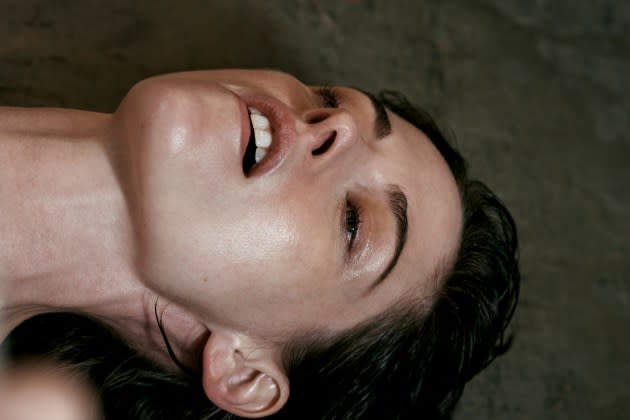
KRISTEN STEWART IS STRONG as fuck, and I do not mean this metaphorically. I am not, for instance, talking about any experience from her past that she has quote-unquote risen above, like that time she was in those vampire-werewolf movies and dubbed the World’s Most Hated Actress because she did not appear sufficiently stoked to sit in a room full of journalists and discuss making out with her co-stars. Or the time she was photographed kissing her much older (and married) Snow White and the Huntsman director, and, due to the horror this engendered, was banished from the sequel. I am not talking about the bravery it took to play Joan Jett in front of Joan Jett. Or the bravery it took to play Princess Diana in front of the entire moviegoing world. Or the bravery it took to come out on SNL in the form of a snappy retort to the mean tweets of a demented reality-show host turned president. In other words, I am not talking about “strength” as the gold-star descriptor given to famous women who don’t crumble beneath the other labels society lobs at them. No. I am talking, quite literally, about Kristen Stewart’s biceps.
OK, let me back up. It’s an early afternoon in January. We’re on a large deck perched neatly on a hillside of Los Feliz, with a commanding view of tropical foliage. The weather has reverted to that bland meteorological perfection endemic to Los Angeles, despite a morning that was topsy-turvy, bringing down a small tree in Stewart’s yard. “Wtf kinda crazy witch energy you bring to L.A.?!!” read an email waiting in my inbox when I awoke. “It’s crazy out there!” It was the latest message in a chain we’d started to try to figure out what to do on our second day together, though the back-and-forth had quickly devolved (evolved?) into a series of book and article recommendations and Stewart’s confession that, when it comes to these types of interviews, “the disco anxiety is real.”
More from Rolling Stone
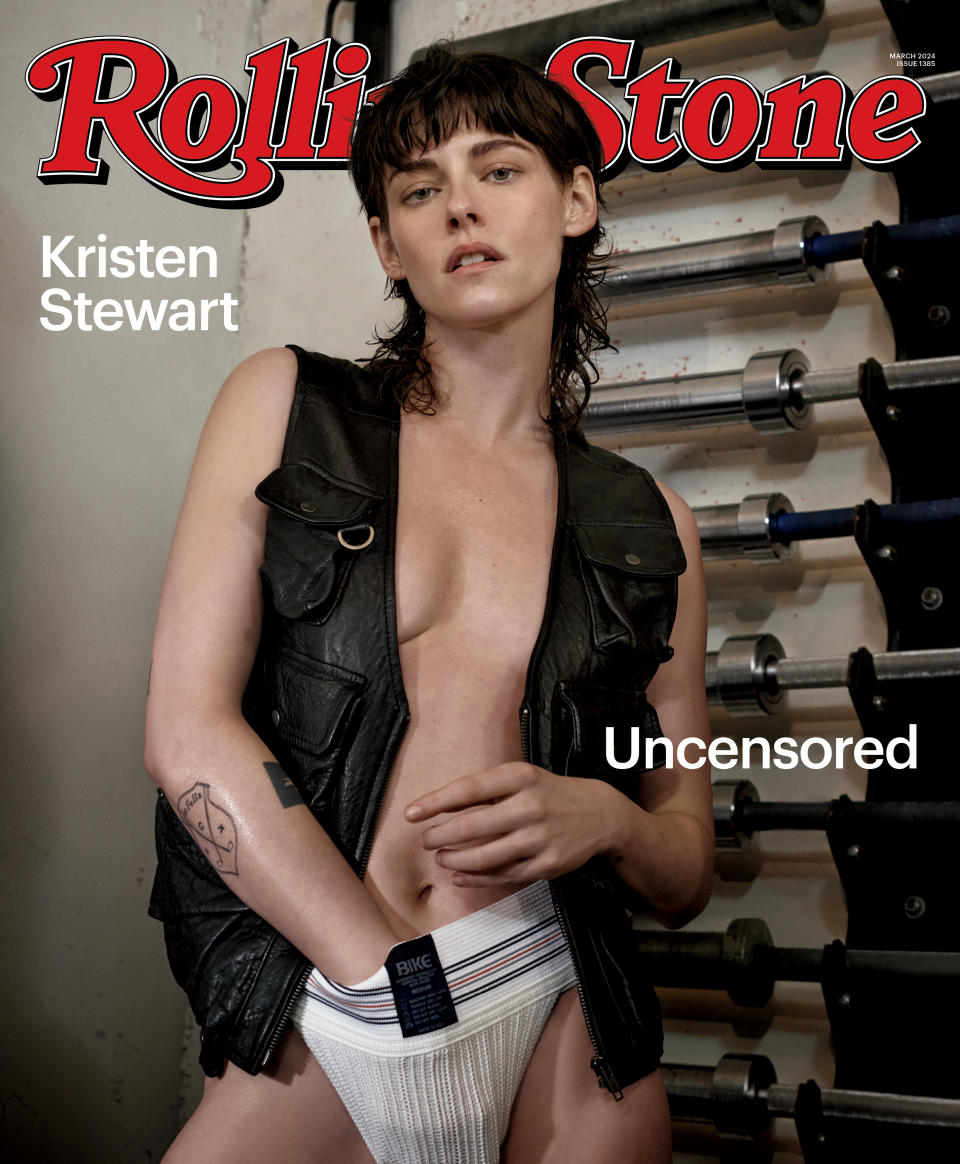
Eventually, she invites me along to what she’d planned to do anyway that afternoon: kickbox with her trainer Rashad. We are ostensibly meeting so she can promote Love Lies Bleeding, a roided-up romantic thriller directed by Rose Glass, in which Stewart plays a gym manager lusting after a bodybuilder (played by Katy O’Brian) who, as Stewart describes it, “comes in and shakes up the Coke can, but it fucking explodes and everyone gets messy” (“messy” being the quaintest way possible to describe the bloody, sweaty, id-driven hellscape that follows). In this context, kickboxing is the sort of cliché, movie-promotion-adjacent thing Stewart would usually refuse to do, and therefore, we figured, the most subversive thing she could do. “Less talk, more rock,” she advised.
By now, it’s pretty well-established that “subversive” is Stewart’s thing. Imagine her, age 17, refusing to play Bella Swan in the perky, bright-eyed manner the adults all had in mind, and choosing instead to mope around like she was actually in love with an undead person. (“The studio was trying to make a movie for kids. They didn’t want what actually was the book. When the fuck are [Bella and Edward] smiling, ever?”) Then, having spent five years on a franchise that earned more than $3.5 billion worldwide, spawned such things as Twilight-branded blow dryers, and momentarily made Stewart the highest-paid actress in the world, there was the transition once and (mostly) for all to art-house indies — which she’d been making in between all those Twilight installments, sometimes shooting three or four movies a year. There was Clouds of Sils Maria, for which she turned down the part of the starlet in favor of the slightly grubby assistant, and proceeded to win a César (the French equivalent of the Oscar), the only American woman to have done so. There was Spencer, which earned her an Oscar nomination for Best Actress for so artfully crawling out of her own skin. After we hung out, she was headed to Park City, Utah, where she was being honored with a Visionary Award while premiering her 11th and 12th Sundance films — Love Lies Bleeding as well as Love Me, a post-apocalyptic romance in which she plays a buoy to Steven Yeun’s satellite (“Basically, the internet — the knowable universe — is contained in this machinery, and they start trying to figure out how to date,” she explains). “We were starting to film, and it can be a very tense scene,” Yeun tells me of working with Stewart on such an unconventional project. “She just put her hand on my shoulder and was like, ‘Hey, I like you.’ And that just melted away all the brain fog. She’s very deep and cool that way.”
That depth and cool have long made Stewart a go-to choice for countercultural roles, women who stand out because they are at a remove from whatever world envelops them. But they are also the qualities behind Stewart’s ability to make characters seem countercultural by virtue of the fact that she is playing them, bringing a reserve and restraint that might seem like underkill in a franchise in which she has to speak, out loud, lines like “Hello, biceps!” but that scintillates in more nuanced fare. “She understands how people cover, and she is able to play that, which makes her work so interesting and different,” says Jodie Foster, who began shooting Panic Room with Stewart when she was 10. “I remember just being in awe of this kid.”
By the time I arrive at her house, Stewart, now 33, has been up for many hours. There was a spell when she had “a very fucked-up relationship with sleep,” but now she goes to bed early and rises early, waking up to work with fiancee Dylan Meyer on one of the many projects being spearheaded by Nevermind, the production company the two founded with producer Maggie McLean in 2023. (Stewart tells me that it wasn’t named after the Nirvana album per se, but that they do share the band’s urge to “somehow slip in and fuck shit up for the better.”) “Me and Dylan are writing something, so the first three hours, we treasure them. Our brains are just working well at that time,” Stewart says. “When she moved into this house, I had no curtains, three forks, and I never drank coffee, and I was like, ‘I don’t sleep.’ She’s like, ‘In the morning, you drink coffee and you work, and you’re alive, and you’re awake, and then at night you close the curtains.’ In retrospect, it was so obvious.”
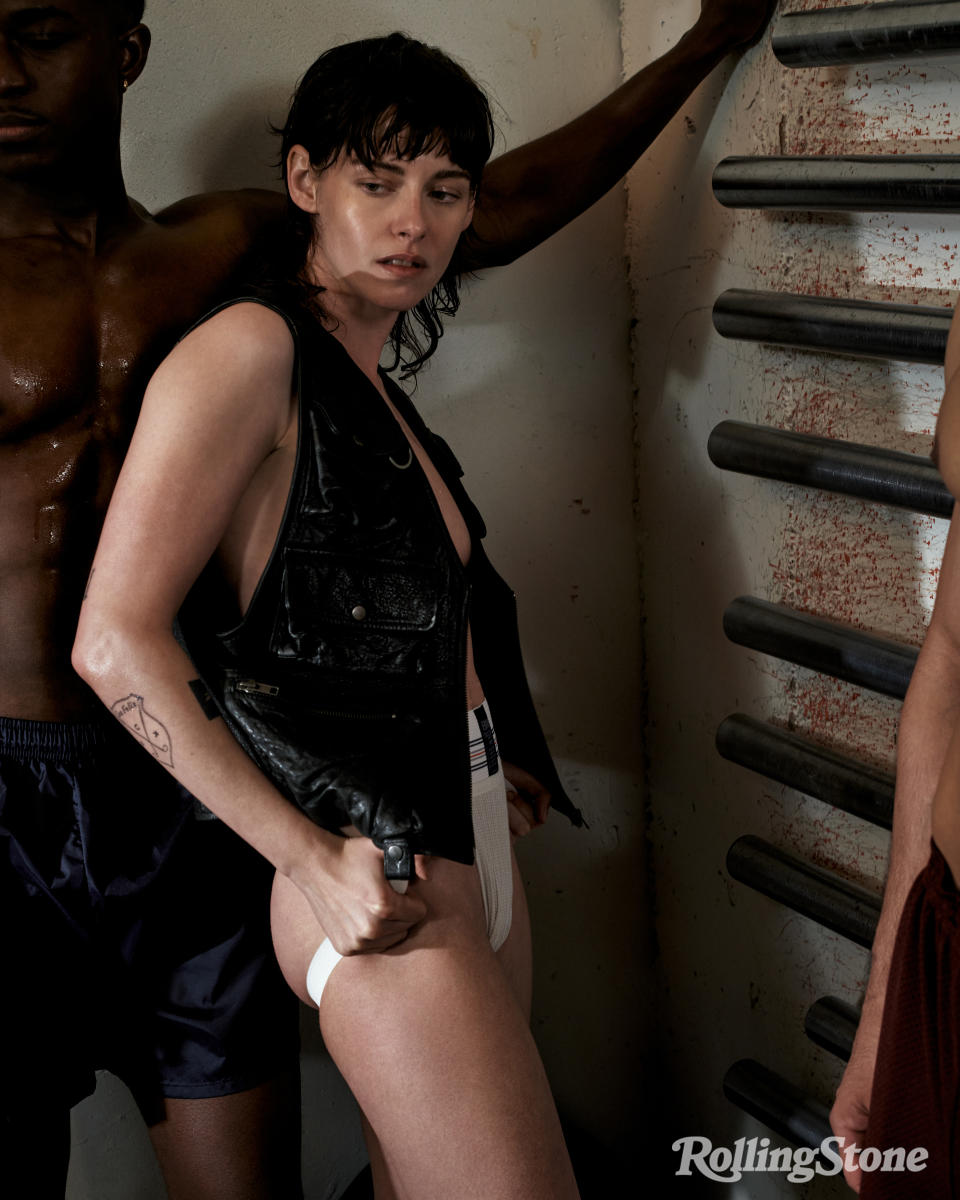
When Stewart leads me outside, Meyer is already on the deck, limbering up in a white New Order T-shirt while Rashad arranges yoga mats and free weights. Soon Stewart has a playlist going, and Rashad is having us “separate our shoulder blades and engage our core” to the croons of Vivien Goldman as Stewart’s black rescue mutt, Cole, meanders between the mats. We stretch. We shadowbox. Then comes the moment Stewart had warned me about: the chin-up competition on a free-standing contraption set up on the deck. I do approximately zero. Meyer manages several. Stewart does chin-up after chin-up after chin-up, then switches to a different grip and does some more, as we all look on admiringly.
“You should know that Kristen is good at everything. It’s both inspiring but also annoying,” Meyer says to me quietly without a hint of actual annoyance.
“Let’s go, let’s go, let’s go!” Rashad screams. “You’re strong as fuck, let’s go!”
Stewart finally drops from the bar, panting.
She flashes that famous sideways grin, and then glances toward the body pads: “Let’s get in the ring.”
It was really fun to be allowed to have the little, dykey sister be the main protagonist.
IT HAD BEEN A SUBVERSION of the idea of a “strong woman” that led Stewart to Love Lies Bleeding, she’d told me a few weeks earlier, sitting in her living room on a black leather sofa under large metal letters that spell out “ASS.” This afternoon, it is witchy raining, and the view out the glass doors barely goes past the deck, where in addition to the pull-up stand, there is a claw-foot bathtub Stewart had moved from one of the bathrooms and hooked up outside (“It breaks a lot, but it’s really fucking nice to take a bath out there”). Unimposing from the outside, the house slopes down the hillside elegantly, but is haphazardly furnished and a little unkempt. Across from the sunken living room — where a white plastic mannequin perches on a bench laid out with stacks of Nevermind scripts and papers — there is a wall of books to one side (Mary Shelley, Jack Kerouac, Kim Gordon, Kathy Acker) and a sort of game room to the other, complete with an orange-topped pool table, a Playboy pinball machine, a row of metal lockers, and a refrigerator with a large orange biohazard sticker on the door. A room off the kitchen boasts a crumbling sofa, a drum kit, and a collection of acoustic and electric guitars. Near the stairs, water stains mark the ceiling, and the words “life is beautiful” are graffitied in bright-red paint.
“Just so you know, that ‘life is beautiful’ thing — do you know Mr. Brainwash?” Stewart motions wryly to the graffitied wall. “He came over with a friend of mine and did this, and I was like, ‘So I know that I do sort of live in a frat house, but that is psychotic.’ Do you know what I mean? To think that you could just do that to someone’s fucking house.” During the pandemic, Stewart graffitied the word “MAINLY” underneath in all caps. “Anyway,” she continues, shrugging, “just to contextualize that: Fuck that guy.”
Stewart bought the house about 12 years ago, as a place to “go hide in” during a breakup with Robert Pattinson, back when they were both having to ride around in the trunks of cars to try to thwart the prying paparazzi. In a theoretical way, she understands the interest people still have in that relationship — she really does — but as she’ll later tell me: “Rob and I can’t just keep talking about that shit, because it’s fucking weird. It’s like if someone kept asking you — I mean for literally decades — ‘But senior year in high school?’ You’re like, ‘Fucking A, man! I don’t know!’”
Whatever her reserve on film, today Stewart has an excitable, spring-loaded quality. Soon after we begin talking, she wanders off, without preamble, to change from black leather workman’s shoes into sneakers (“I’m a soft-shoe guy. I went somewhere today and got dressed or whatever, but now I’m like, ‘Why the fuck am I in these big shoes?’”). A few minutes later, she wanders off again (“She just keeps walking away from me,” she narrates from my perspective), and returns from the biohazard fridge with two Coors Lights. “You can have a beer if you want,” she announces. “I’m going to have one.”
We crack open the cans. She returns to the couch. She wears a worn, black T-shirt with holes in both armpits, baggy black jeans, and chipped black nail polish. Her mullet is pulled into a short ponytail at the back of her head, dark strands escaping errantly.
“Do you already know what you’re—” she stops herself. “I know actors are defensive. I don’t mean this, like, ‘Do you already know what you’re going to write?’ But are you already — I don’t know — a little outlined or something?”
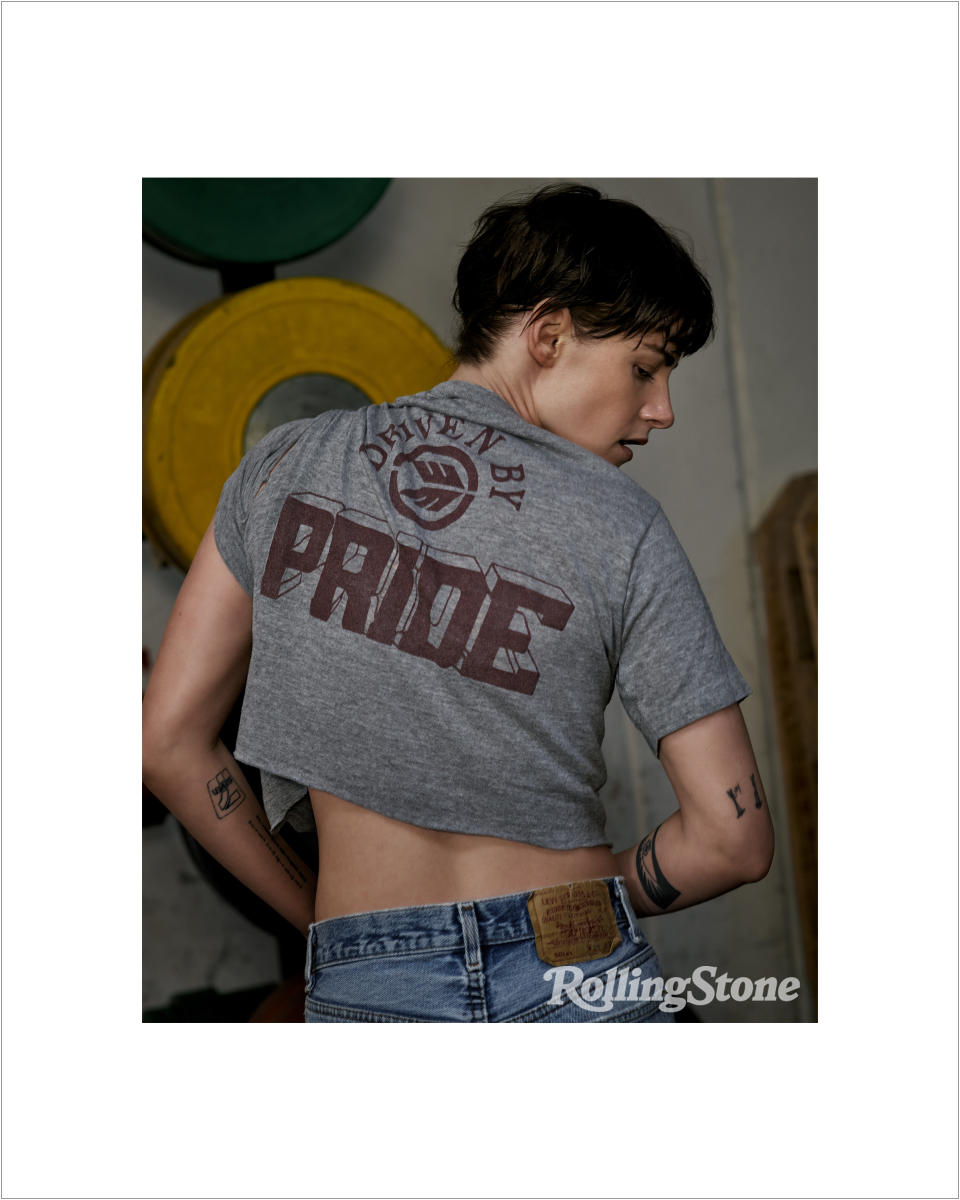
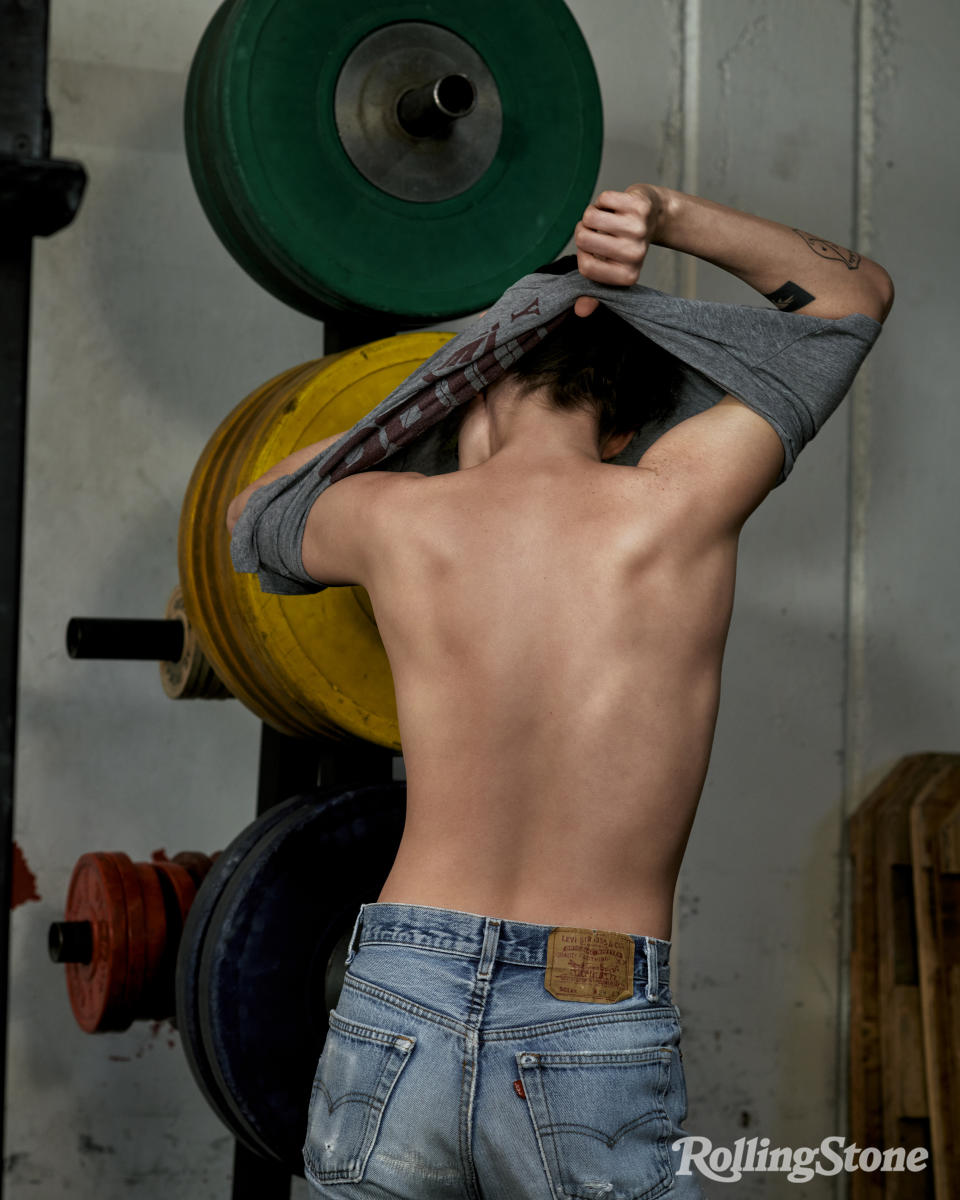
No, I tell her. We only just met. How could I know what the contours of the story would be?
“OK, cool.” She leans toward me, legs wide and elbows on her knees. “We’ll figure something out.”
There’s a lot to say about Love Lies Bleeding, so we might as well start there. And here’s how that went: Stewart was in London for the premiere of Spencer. The morning after, having slept not a wink (“We were really Englanding out”), she came down to the lobby of her swanky “press junket” hotel for a meeting with director Rose Glass, whose debut film, Saint Maud — a psychological fever dream about religious obsession — Stewart had loved. They sat at a table off to one side. They sipped tea. Glass explained that her takeaway of what people wanted from her next was a film about a strong woman, a strong lead character.
“What does that mean?” Stewart asks now, narrowing her eyes. “It’s bullshit. It means that we’re not actually letting women define themselves. It’s the assumption that we need to be empowered by the people deciding who gets to have perspective, that we have to provide something aspirational. It’s the lowest-hanging fruit there is.” Glass told her that she had figured out a way to subvert that expectation: She had taken the note literally. “She was like, ‘Strong girl? Bodybuilding. Got it.’ Simple as that.”
I loved to be sad and shit. Oh, my God. I made a complete art project out of it: my whole life.
By the time she left the meeting, Stewart knew she would take the part that Glass had written with her in mind — the role of Lou, the gym manager, who is butch and tough and closed like a fist, until the bodybuilder, Jackie, explodes her whole world — but she didn’t officially sign on until she’d returned to L.A. and read the script. “I had some friends over for dinner when I got the message,” says Glass of receiving the news. “I think I was a bit drunk already. I just remember there being lots of very jubilant shouting and excited jumping up and down.”
Afterward, Stewart finished the campaign expected of Oscar-nominated actors (“It becomes like you’re teaching a curriculum on your movie”) and then flew to Albuquerque, New Mexico, where Love Lies Bleeding would film, showing up at Glass’ house with a stylist to lay waste to Diana’s blond hair, even grabbing the scissors at the end to make it look like Lou had cut her mullet herself. “Once I cut my hair, I was like, ‘See you, forever,’” Stewart says of leaving Spencer behind.
Lou was a very different story — a character whose seedy, pumped-up world could not have been more different from Princess Diana’s gilded cage, whose sex scenes were about female pleasure and female bodies alone, who wasn’t aspirational or going on some journey of self-discovery, and who was not at all the type of person about whom movies are generally made. “It was really fucking fun to be allowed to have the little, dykey sister be the main protagonist in a movie,” Stewart says. “That’s never the main character in a movie. That’s never the one that you want to fuck. I mean, that’s the one some people do, but not the one that you are prescribed to want to fuck.”
As an openly gay movie star — “and there aren’t that many openly gay movie stars” — it felt personal in a way Stewart hadn’t quite expected: a queer film that didn’t revolve around the “coming out” narrative, and in which the queerness was less a plot point than a vibe. She has long talked about roles as not a form of escapism, but rather a means of exploring different facets of her identity — imagining who she might be if her “nature” had been exposed to an entirely different “nurture.” But playing Lou felt like a return to her “first setting,” she tells me. “It is a really weird, kind of moving return to form in some way. Kind of like who you are when you’re 11 — physically, the clothes you choose to wear — before you’ve just been pummeled by male expectation.”
She takes a swig of beer and leans back into the sofa. “I never have felt like I have performed a femininity in order to reap its benefits in a way that felt like a lie,” she continues. “I’m very fluid, and I’ve never felt like, ‘Oh, wow, I was doing this lie for a long time in order to get jobs.’ That would be wrong. I have had a good time playing with all of the tonal qualities. But there’s so much room for success when you choose the girlie one. There’s no room for this other one.”
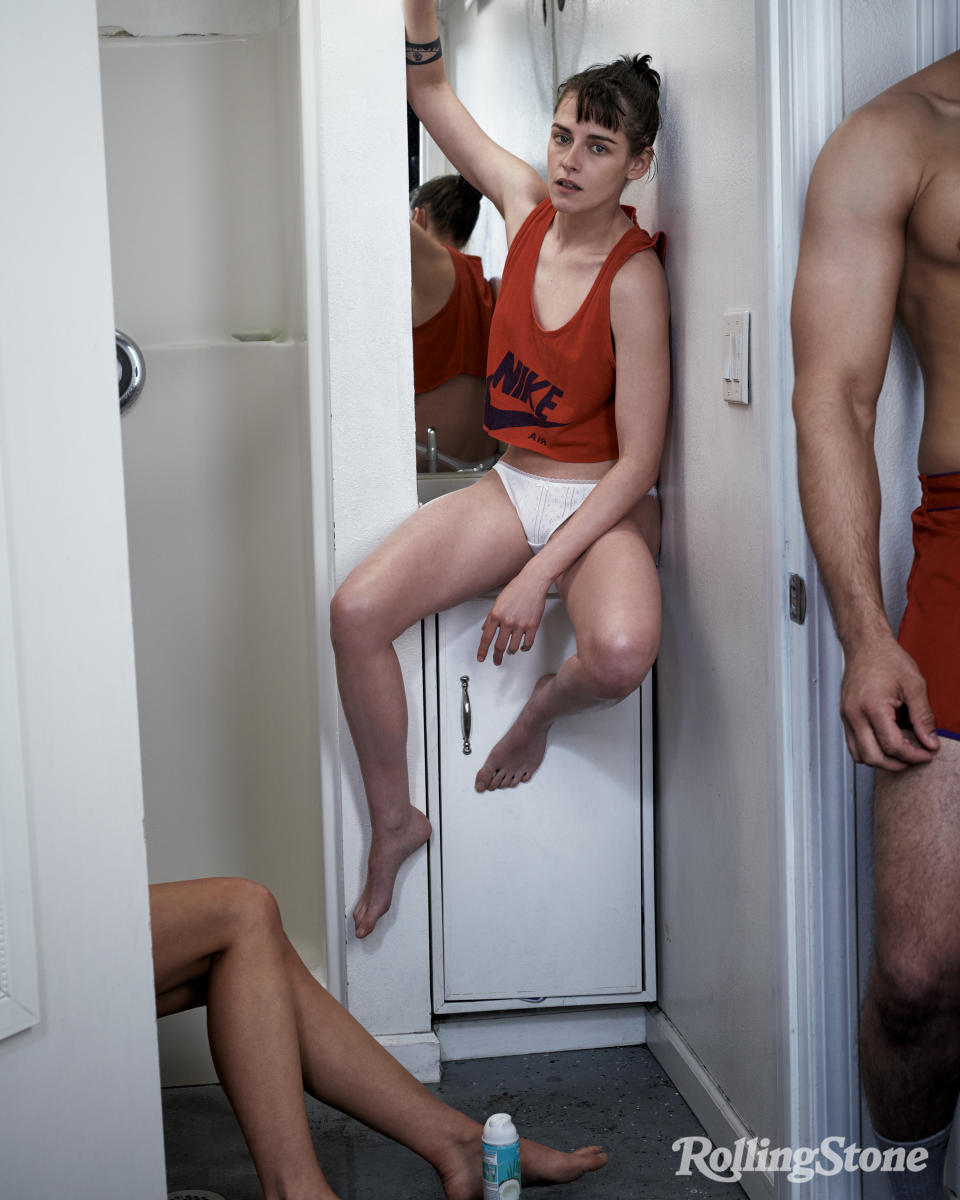
OK, LET ME BACK UP AGAIN. Because nurture does matter, here are some broad strokes.
Stewart grew up in the Los Angeles suburb of Woodland Hills. Her dad was a stage manager who worked on shows like the Oscars and Fear Factor, and when Stewart went to work with him, she hated it — all the rushing around and commotion (“I would hide in the engineers’ room and play bass with them”). Her mom was a script supervisor who worked on movies like Mortal Kombat and Little Giants, and when Stewart went to work with her, she loved it — the quiet and stillness, the feeling of everyone working together to suspend some fragile bubble of make-believe. When she was eight, and because she had noticed acting was the only job kids could have that allowed them to miss school, she asked her mom to take her to an audition seminar, one of those one-stop shops where you get headshots and the promise of being connected to some agents if you don’t suck too much. Stewart — whose drama experience up to that point consisted of reenacting scenes from Titanic on the jungle gym at school — found that she didn’t.
She booked a Porsche commercial. Then she booked The Safety of Objects. Then David Fincher saw the Porsche commercial and had his people track her down, and she booked Panic Room. “I mean, everybody said at the time, ‘Look, if this kid wants to continue to do this, she’s absolutely got the acumen; she’s got the sensitivity,’” Fincher tells me. “But when you’re standing next to Jodie Foster, and the question for a 10- or 11-year-old is ‘What do you want to do with the rest of your life?’ — you know, Jodie’s extremely protective of people who are not capable of making those decisions: ‘She doesn’t need to think about that. She needs to think about what we’re doing before lunch.’”
Anyway, there was only so much Foster could do: When shit hit the fan for Stewart, career prospects had nothing to do with it. Puberty did. “It’s as soon as I started to want to have sex,” Stewart specifies of the moment in sixth grade when she went from being like “everything’s fucking gravy” to suddenly feeling like “I can’t find the words and I want my face to be on the back of my head instead of the front.” She takes another gulp of Coors: “Puberty is a real fucker.”
There are a few core memories here: the time she went to school with her legs unshaved and someone was like, “Eeeewwww”; the time she accidentally hit a friend in the nuts, and he howled “Oh, you fucking man!”; the way guys treated her girlie friend Britni vis-à-vis the way they treated her. “I was immediately aware that these guys who I was friends with saw me as not fuckable,” she says. “My sexuality is totally fluid. I’m all over the fucking map — and I think I was then. But I also really wanted to be normal and hot, so I was like, ‘Cool. I’m going to do everything I can to try and fucking figure out how to look like a girl and get these guys to like me.’ That’s it. It’s totally a normal story.” Except that it didn’t play out normally because by then she was well on her way to filming movies like Into the Wild and Adventureland and — as part of her actual Twilight audition, believe it or not — rolling around with Pattinson on director Catherine Hardwicke’s own bed.
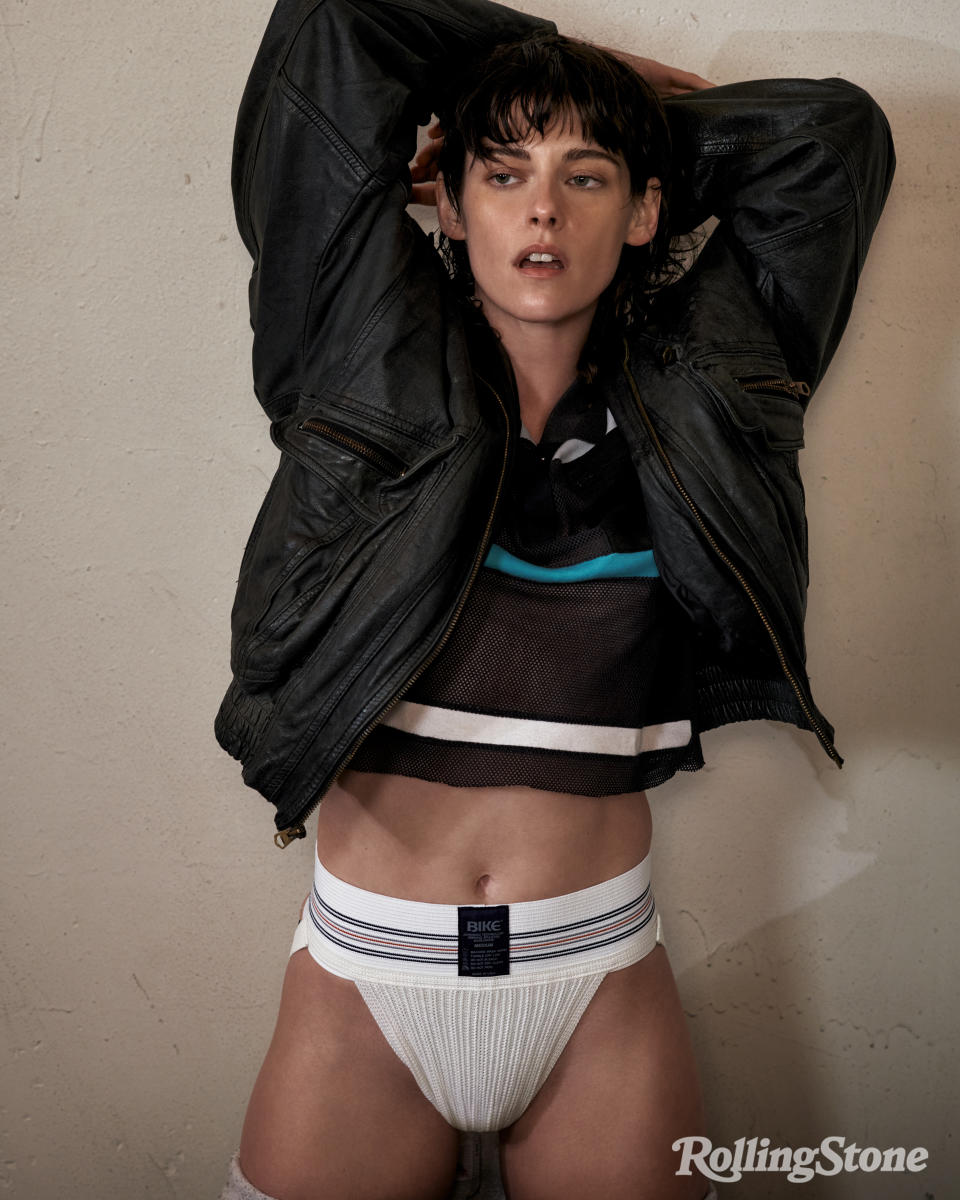
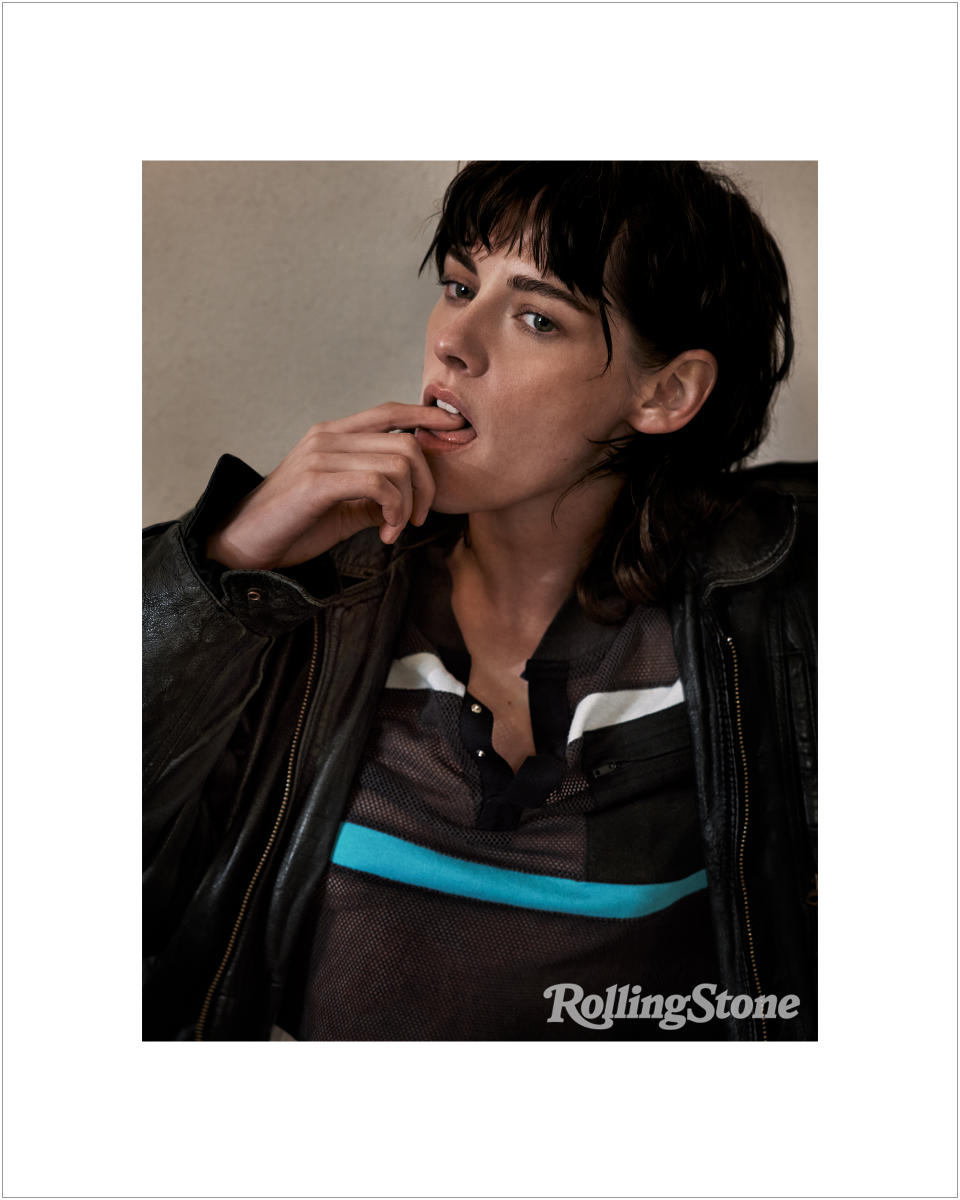
Which means that while Stewart was still figuring out who she was and what being “fuckable” meant to her, the world was busy schooling her on both fronts. She couldn’t leave the house without the male gaze following her in the form of TMZ photographers, couldn’t arrange her face without becoming the cultural signifier of every single woman who’s ever been told, “You’re so much prettier when you smile.” Plus, it was the aughts (“The Nineties and the early 2000s were really horrific for young women. Don’t you feel that way?”). Her anxiety got so bad that she’d lie on bathroom floors, unable to unclench her fists — so bad, at one point she had to be hospitalized (“They were like, ‘She’s dehydrated.’ I was like, ‘I’m not dehydrated. I’m fucking flipping out.’ They gave me an IV and a mild sedative, and I started calming down and my hands started opening up, because you fucking atrophy”).
There was a span of years when she couldn’t enter a room without scoping out the exits, when she needed to know where a bathroom was at all times (“I was always like, ‘Who knows? I could spontaneously combust in a puddle of puke right now’”). There was that period when she couldn’t sleep, and then got addicted to not sleeping, thought she might die from not sleeping, but then, somehow, didn’t. “I loved to be sad and shit,” she tells me. “Oh, my God. I made a complete art project out of it: my whole life.”
Of course, all of that was a long time ago. Stewart wanders over to the fridge and gets us another round. Here’s the thing: She’s grown up. That’s not who she is now. But also: In a way, it kind of is. As a queer woman in the public eye, she’s had occasion to think about identity, and what it all means. She’s considered the arc of things. “And it goes: Jodie [Foster], me, boygenius,” she says, plainly, of the spots she imagines they all hold on the queer-celebrity continuum. “I’m in the middle. Do you know what I mean? Jodie had such a hard time [as a gay actor], and I’m not speaking for her — I am objectively analyzing the time and place in which she was being her, and that is not easy — I would say fucking near-impossible if you wanted to continue doing what you love.
“For me, it wasn’t a problem,” she continues. “But that’s probably because of the sort of space that I inhabit and the parts that I’m attracted to and the filmmakers that are attracted to me and the audience that exists for those movies. Had I really wanted to carve out more commercial space and maintain that, I don’t know if that would’ve worked.”
Still, she points out that, for her, coming out was not a painstaking process. She was “very physically out with my body” long before she publicly came out on SNL. And even that was a “very shoot-from-the-hip moment,” she says. “It did not feel like this bloodletting.” Nor was it something she’d planned in advance. She was merely sitting with the SNL writers, going, “This is the most boring monologue ever. What are we going to do? What the fuck?” when someone brought up Trump’s tweets about her. “He’s mad at me for cheating on my boyfriend?” she’d retorted. “Little does he know.…” As soon as the words were out of her mouth, she knew she’d use them. (As for her thoughts on Trump? “Of course he had to weigh in on my tarring and feathering. It’s like, ‘What is this 20-year-old who has no idea about life doing to this man?’” And: “He’s such a little baby.” And also: “Fuck you, bitch!”).
She says that Foster has been a mentor to her — a number she will keep in her phone always, even if they aren’t consistently in touch — and she’s aware that her own openness about her queerness has likely been a model for others. But she also knows how much the needle has kept moving, at least in the “specialized little nook” of the world where she resides. She directed boygenius’ “The Film” — a 14-minute music video that culminates in the three musicians making out with one another — and she can see the evolution from herself to them, how she has an awareness of gender-conformity that feels very “millennial” compared with what’s on offer now. “I look at these kiddos that are so chilling on all of those fronts, and can have [gender] be like an accessory, can actually play with the novelty of that — have [femininity] one day, not have it the next.” It’s a psychological fluidity Stewart covets: “I’m so aware of these things.”
And so she did what she could: She leaned into that awareness. She began reading mainly female writers (“I was really obsessed with male writers. I’ve only recently been like, ‘What the fuck are they doing?’”). She began boning up on gender theory, giving herself the college education that, in another life, she might have had. She began thinking of female bodies not just physically and sexually, but also metaphorically (“The coolest fucking part of us is that we have this ever-present and unclosable opening, and we’re walking around with it all the time, and we sort of pretend like it’s not there, but it’s our greatest strength”). She began to interrogate the “violence of the dynamic” when it comes to gender, whether someone has had a #MeToo moment or not (she says that she hasn’t). “The violence and the shame that women internalize and then use as triggers for pleasure? We can’t get away from it,” she says. “To think that we know what we want in a way that’s remotely divorced from the patriarchy is impossible. We will never. And I’m so much more interested in leaning into that versus away.” In other words, she began, as she puts it, “Vagina Monologue-ing all over the place.”
Now, I want to do the gayest fucking thing you’ve ever seen in your life.
Some years back, Stewart read a memoir that seemed to magically spew onto the page all that was cohering in her mind. Before she’d even finished The Chronology of Water, she emailed its author, Lidia Yuknavitch, asking if she could adapt her story, a cult favorite about female shame and female rage and female art and female-on-female BDSM and a bunch of other things “so taboo it’s almost horny.” It took Stewart years to complete the screenplay, which she refers to as a “living document.” For several weeks while she was working on it, she camped in a van outside Yuknavitch’s Pacific Northwest home. Then she read the script to Yuknavitch, out loud, in the writer’s living room. Then she cast Imogen Poots to play Yuknavitch. Then she went looking for money to make the actual movie, which proved to be damn near impossible because, as it turns out, female shame and female rage and female art and female-on-female BDSM are topics that are not seen to lend themselves to box-office gold. Which only underscored how every single fucking thing in the book was true.
We’d been having a fairly chill time up until this point, but suddenly Stewart is standing up, pacing back and forth in front of the bookshelf. She knows her screenplay is “radical in a million ways.” She knows she’s never directed The Tree of Life. But she also knows the misogyny embedded in the system and that she could make something subversive and beautiful and true if only she were given the chance. “And it makes me fucking angry. And not in a way that’s like, ‘I’ve been doing this for so long, and so therefore I deserve it.’ It’s really more like, ‘If I were a man, you would fucking believe me!’”
Stewart’s voice has risen to the point that she is screaming now, over there by the books. Eventually she strides to the pool table and begins racking the balls.
“Do you want to play a game of pool?” she asks. “It’s the party trick of any fledgling lesbian.” It may be worth mentioning that we are not entirely sober at this point. Outside the window, it’s too dark to tell if it’s still raining.
Stewart chalks a cue and then leans over the table and breaks. It’s soon clear that she’s the better player: When she sinks a ball, it’s swift and decisive. Still, she’s distracted by the conversation. Have I read any Jeanette Winterson? Or Kate Zambreno? What about Genesis P-Orridge’s memoir? That’s an extreme experience! Do I realize that we are setting ourselves up for failure here, with this whole cover-story thing? That it’s impossible to pin down any moment in time, any fixed identity? Still, she wants the cover image to send a clear message: hyper-sexualized, left of andro, and flipping the gender script. “If I got through the entire Twilight series without ever doing a Rolling Stone cover, it’s because the boys were the sex symbols,” she points out. “Now, I want to do the gayest fucking thing you’ve ever seen in your life. If I could grow a little mustache, if I could grow a fucking happy trail and unbutton my pants, I would. Guys — I’m sorry — but their fucking pubes are shoved in my face constantly, and I’m like, ‘Ummmm, bring it in.’”
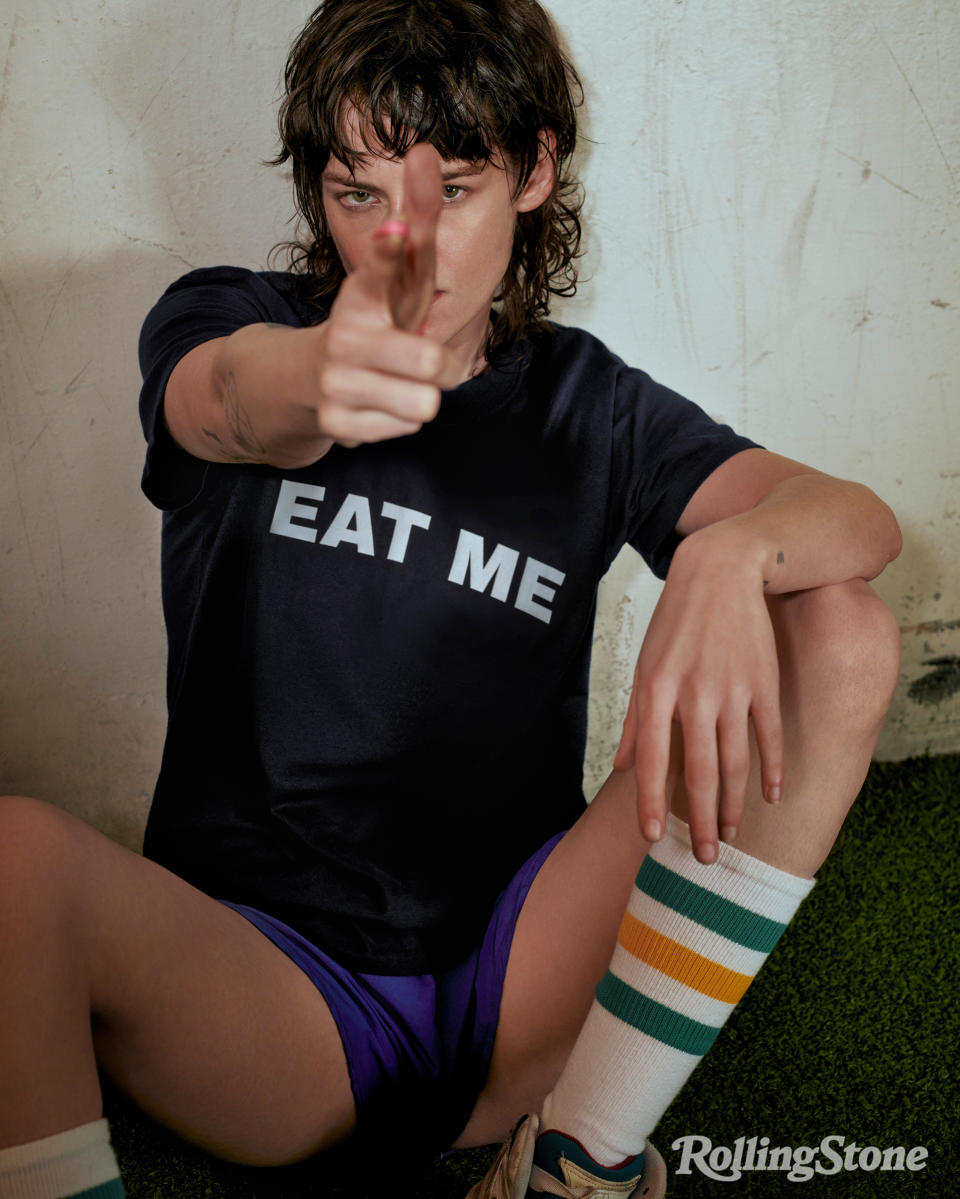
Apropos to that, she won’t give up on Chronology, she wants me to know. She’s been talking about it with journalists for years — to the point that it’s getting embarrassing — but it’s now her only plan for the future. She’ll keep writing things with Meyer, keep looking for other stories they could tell that she feels aren’t being told, but she’s not taking other parts; the next movie she films she wants to be her own.
I make a bank shot, and she looks at me with mock horror: “Now get the fuck out of my house.”
BY THE TIME WE PLUNK ourselves back down in her living room a few weeks later, Stewart seems more relaxed, and not just from the endorphins released by her millions of chin-ups. About a week before our first meeting, she’d traveled to Latvia to lo-cation-scout for Chronology, and had been astounded by the beauty and diversity of the landscape — beaches that looked like Florida just a few miles from forests that looked like the Pacific Northwest. She’d now calculated that the movie could be shot there for a fraction of the cost, and though it was weird for her to consider making a movie outside of the Hollywood system, she was coming around to the idea. With these set pieces, she felt she could keep the project small and intimate, could suspend that fragile bubble of make-believe. “I don’t want 80 people on set,” she says. “If I see a truck, I’ll lose my fucking mind.”
Over the years, Stewart’s most intimate relationships have tended to be with people she views as creative partners, which, she admits, has “not been great for having relationships.” When it comes to Meyer, she says, “we don’t have that separation. I found the right person because I can be so obsessive about what I do. And luckily my girlfriend, my partner, we are into the same shit. We have taken the things that we’re spending our time on and interlocked them, and we’re so much fucking smarter and stronger together. And you’re just like, ‘Fuck, that is the best.’”
The two met on the set of American Ultra, connected immediately (“in a way where you aren’t sure if you want to fuck or be like, ‘Dude, let’s think of a handshake’”), and then unconnected immediately because of other romantic entanglements (“We were both so wrapped up in fucking other things, literally”). Six years later, they ran into each other again. Stewart asked why they hadn’t stayed in touch. Meyer said she’d emailed. Stewart scoffed and then — oops — pulled up all the messages she’d ghosted. “It was my fault, for sure,” she says. “But then I very much made this [relationship] happen. I was intense, because I was just positive.”
Which, she found, was an interesting place to be. For so much of her adulthood, Stewart had felt unsettled. Years had been spent “really white-knuckling life and getting off on the highs and lows of things” and running headlong into “fucking horrific relationships” and leaning into experiences that were “emotionally psychotropic” because you can then “put so much into your art.” And art had come out of it, art she’d sometimes even been proud of, art where she’s been able to “deposit desire in people” and make her feelings their feelings — and, honestly, what’s fucking better than that? “There was never a moment where I was like, ‘Man, what am I doing with the time that I have on this Earth?’” she says. “I don’t know what the fuck else I’d be doing. I love it.”
And, look, it has been great to experience all these facets of herself, great to try them on and then figure out how she wanted to cast herself in her real life, which — let’s be honest — is what we all do, all the time: “We make choices every fucking day about who we’re going to be. Not in a controlling way, but just in a way that acknowledges, ‘This is who I am. It’s the easiest one. It’s the one that’s the most comfortable. It’s the one I’ve chosen.’”
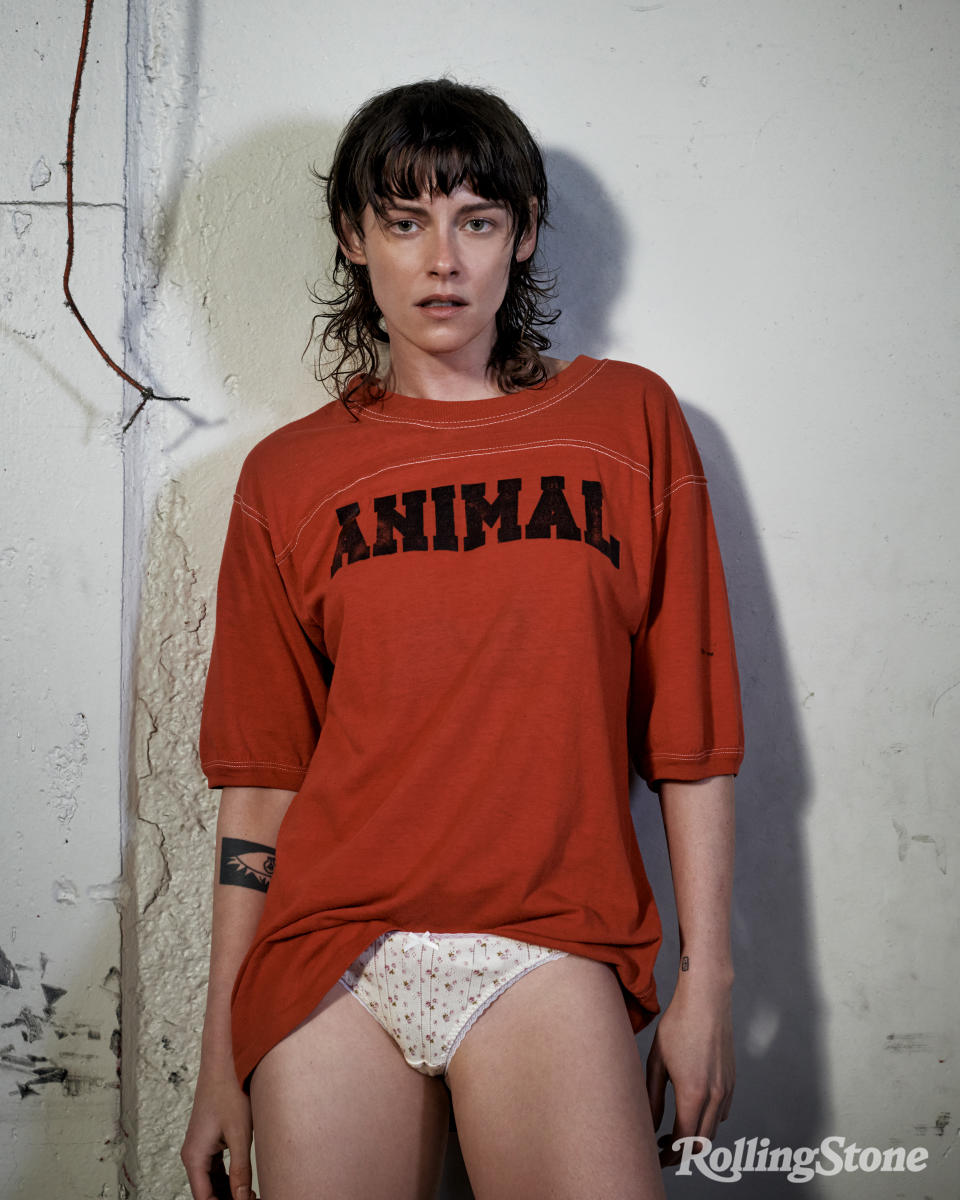
But also — and bear with her here; she knows she’s about to contradict herself — she’s aware that there can be something fundamental to who we are that can be lost and hard to retrieve. “I feel like I’m just getting back to that 11-year-old,” she says. “It does take kind of a long period of growing up in order to get back to who you were when you were a little guy.” She knows these things “might seem like a contradiction, like I’m presenting something that doesn’t play well together.” She balks at the concept of “authenticity” (“Are you fucking kidding me? We are all so malleable”). But she still feels like maybe there’s something essential that you feel the loss of when it’s denied, something that can help you grow into who you once were and stick that out, because “it’s boring to not. It is unevolved to not. Now, I’m actually creating a home where I’m an adult and a person.”
A few years back, Stewart and Meyer moved into a house down the road, keeping this one to use as the offices of Nevermind and as a landing pad for friends going through breakups or other hard times, as Stewart was when she bought it (she refers to it as the “Heartbreak Hotel,” adding that it’s otherwise “crazy to have a secondary mansion down the street from your house”). Since Meyer proposed in 2021, they’ve thrown around ideas of how they want to get married, once joking (or half-joking? Or not joking?) that they wanted Guy Fieri to officiate. Since then, they’ve realized that their main focus needs to be their two passion projects — Stewart’s Chronology and Meyer’s The Wrong Girls, in which Stewart will star and which she describes as “a stoner buddy comedy about two slacker girls coming of age.” It’s the one movie that Stewart says that she would do if it got greenlit before Chronology. With all that percolating, Stewart explains, “we don’t have it in us to have a big wedding. We’re probably just going to do it soon. We just are busy trying to make movies because they’re our babies.”
Then again, they’ve been talking about the possibility of actual babies. “I don’t know what my family’s going to look like, but there’s no fucking way that I don’t start acquiring kids,” Stewart told me during our first meeting. “And also, ideally at some point soon I go, ‘I want to have a kid.’ I really want that to happen.” Having watched that desire solidify in so many of their friends, she and Meyer have started making preparations for how they might go about getting pregnant, and have discussed the possibility of carrying each other’s embryos. “I’m not scared of being pregnant. I’m not scared of having a kid,” Stewart tells me. “But I’m so fucking scared of childbirth, it’s crazy. Have you ever been too on drugs where you’ve suddenly needed to be on your hands and knees?” she asks of that sensation of your body operating outside your control. “I hate that. I mean, I smoke a lot of weed — I obviously self-medicate — but I don’t like hard drugs. And I’ve tried — a lot. I just can’t deal.” Still, the thought of carrying a pregnancy is so “radical” that she’d like to think she could be up for facing that fear.
Right now, though, she can’t wrap her head around creating anything — or anyone — before Chronology. She hopes that by March she’s in Latvia shooting — she’d love to get there in time to capture some scenes of snow. She shows me the locations deck she put together, then asks if I want to see the sizzle, then spends several minutes fumbling with a remote control (“You know when you’re too fucked up and you’re trying to get music to play? This is like that”). Finally, she gets the video going, the plot approximated in pastiche, the tone strange and dark and exuberant. This is who she is, is what she’s trying to say; she just wants to be able to say it. Less talk, more rock.
So I turn my tape recorder off. We swill some more Coors. The Los Feliz skyline darkens. Eventually Meyer texts to see what’s up, and we head to a dive bar a few minutes down the road where we sit at a booth and eat chicken wings and where not a single person approaches the table except the woman who takes our order. Stewart sits close to Meyer, who does most of the talking (about books, about writing, about how these are the best wings in Los Angeles to such an extent that “I’m not interested in other wings anymore”). Periodically, Stewart reaches out to gently touch Meyer’s neck. At one point, they go outside to split the joint that’s been hanging out behind Stewart’s ear and return smiling and chummy. When the wings are done and the beers are finished, I call a car, and they wait outside with me until it arrives. They give good hugs, both of them.
Before we part ways for the final time, Stewart asks me again if I know what I’ll write about her, which of course I don’t. She’s right: We’ve set ourselves up for failure with this whole cover-story thing. Identity is so fucking malleable, a series of choices made over and over again in service to something elusive. It can take so much strength to drown out all the noise and get to the point where you know how to make those choices in a way that feels true. So, yeah, I guess what I have to say is this: Kristen Stewart is strong as fuck — whatever the fuck that means.
Production Credits
Produced by RHIANNA RULE for PALM PRODUCTIONS. Photography direction by EMMA REEVES. Styling by OLGA MILL for CAA. Hair by ADIR ABERGEL for A-FRAME using VIRTUE LABS. Makeup by JILLIAN DEMPSEY for WALTER SCHUPFER MANAGEMENT using JILLIAN DEMPSEY. Nails by ASHLIE JOHNSON for THE WALL GROUP. Tailoring by LYDIA JAKUBOWSKI. Set design by ALEX CONSTABLE and CJ KEOSSAIAN for MAXIM JEZEK DESIGN for WALTER SCHUPFER MANAGEMENT. Video Editor: BRIANNA DEVONS. Post production by TWO THREE TWO STUDIO. Production manager: XAVIER HAMEL for PALM PRODUCTIONS. Models: GEORGIA STARNES, RHYS ATHAYDE, and KANOR EBEHEAKEY for O MODELS AGENCY. Production assistance: JACK CLARKE and DOUG STUCKEY. Styling assistance by ALYSSA LESSER. Lighting Director ARIEL SADOK, Photography assistance: JACK BUSTER and ALEXIS SOTOMAYER. Digital Technician: MIKE PREMAN. Hair styling assistance by SELINA BOON. Location: ESTLR ATHLETICS.
Best of Rolling Stone
EMEA Tribune is not involved in this news article, it is taken from our partners and or from the News Agencies. Copyright and Credit go to the News Agencies, email [email protected] Follow our WhatsApp verified Channel









